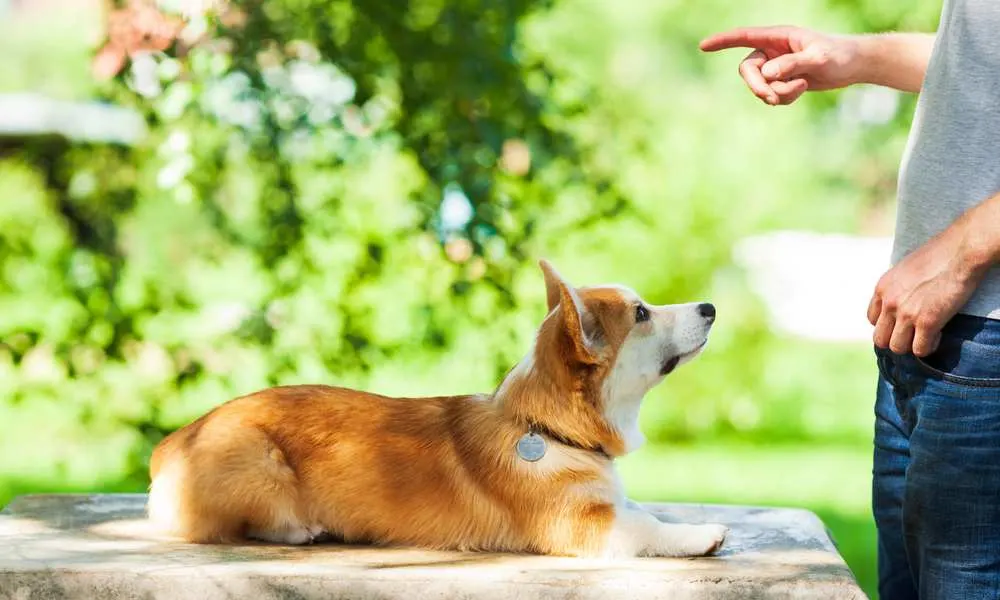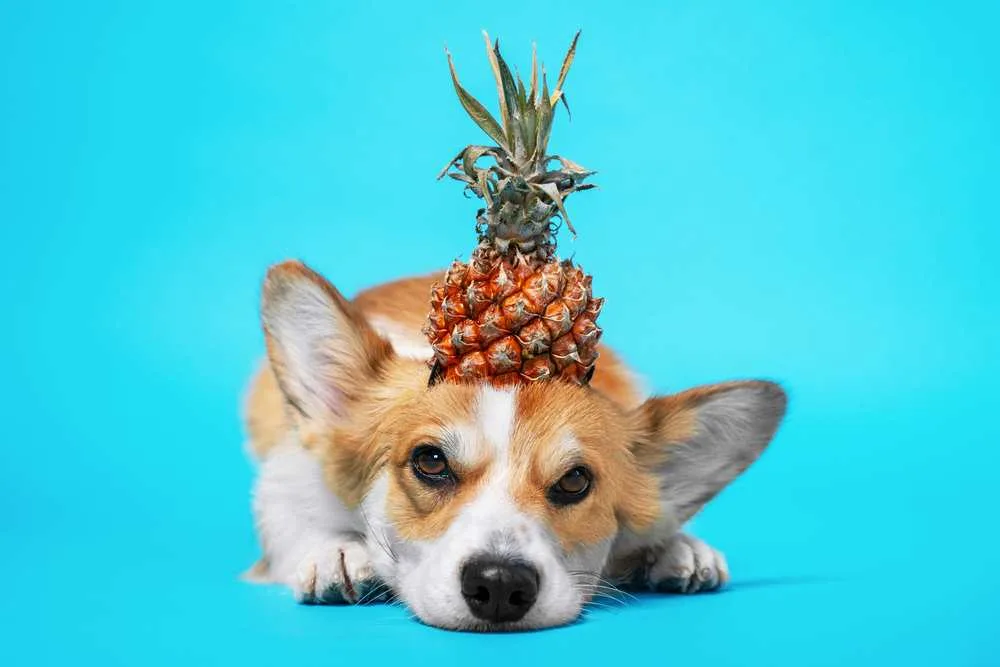A proper nutrition plan is very important in a dog’s life. You should do some background check on the breed you have and then get down to planning its diet. For best results, you should consult your vet. After all, he knows best what’s best for your pup.
Different breeds require different diets – numbers of meals per day, recommended daily vitamin intake, etc. So, if you recently bought a corgi puppy, you would be asking yourself – how much food to feed a corgi puppy? It turns out, these puppies will need all your attention, and you might be expected to prepare some meals yourself.
Continue reading, and we will explain everything connected to your corgi’s starter diet, how to maintain his average weight and what food you should definitely be avoiding in the future.
Stick around corgi owners because this is your “how to feed a corgi puppy 101”.

Prepare The Food
First thing’s first – you should have a clear idea of what and how to feed a corgi puppy. Your corgi puppy may not be ready for all kinds of food, but here is what you can give him for now.
DRY KIBBLE
| PROS | CONS |
|---|---|
| Cheap and available at any pet shop | Poor nutritional value |
| Made from different formulas | Short shelf life |
| Increase the efficiency of the vaccinations | Not regulated by the FDA |
| You can carry it around with you | Possible choking |
WET DOG FOOD
| PROS | CONS |
|---|---|
| Small amount of carbohydrates | A bitt expensive |
| High levels of moisture | Spoils quickly after opening |
| Impressive taste | Can be messy for some dogs |
RAW DOG FOOD
| PROS | CONS |
|---|---|
| Healthy for coat and skin | Expensive to afford |
| A great source of energy | Spoils quickly |
| Better stool | Dificult to prepare |
One other thing you should know – when does your corgi puppy become an adult?
According to the vet, your corgi goes into adulthood after he has passed 12 months.
So, that big transition happens after one year, and significant changes follow as well, but we’ll get to that later. Let’s focus on the puppy period.

A Quick Heads Up
Before including all kinds of vitamins in your corgi’s food, you should know why you are choosing them.
An essential aspect of how to raise a corgi revolves around the vitamins you give him.
For a better knowledge of your dog’s vitamins and what they are for, you should write this information down:
For eye conditions (PRA and glaucoma), include:
- Vitamin A and C
- Beta-carotene
- Lutein
- Omega-3 essential fatty acids
- Carotenoids
For joint problems (hip dysplasia), include:
- Chondroitin
- Omega-3 from fish oils
- Taurine
- Vitamin E
- Antioxidants
For unstable weight (obesity and anorexia), include:
- Low calorie
- Low fat
- L-carnitine

The Forbidden List
Many new owners make a mistake by feeding their puppies almost everything. However, there are many foods that you should keep away from your puppy.
You should set the rules straight before they get used to it and before it’s too late.
Here is a list of foods your corgi should not try:
Chocolate and coffee:
These might be your favorites, but you should never let your corgi eat a block of chocolate or coffee beans. These foods have very strong substances and can be dangerous for your corgi’s heart. An excessive amount of chocolate or coffee can lead to seizures, tremors, and even death.
Onions and garlic:
Any type of garlic is unacceptable because it can provoke inflammation and allergies. Onions can even damage your dog’s red blood cells.
Nuts:
Almonds and walnuts, for example, can turn out to be very dangerous if you feed them to your corgi. They contain a lot of oils and fats that can cause continuous vomiting and even diarrhea.
Undercooked meat and eggs:
We mentioned earlier that you could be expected to cook some food for your corgi. You should not take this responsibility lightly. Uncooked food can harm your corgi’s digestive systems. So be careful and carefully read the recipe.
Unverified medication:
Sometimes, it doesn’t have to be the food that is the main problem – it can be the vitamins you include in it. Improper medicine is a real problem, and sometimes even the smallest vitamins can cause big problems. Always double-check with the vet before including some extra supplements in your corgi’s diet.

The Feeding Chart
Puppy dog diets are serious, and they will take up all your attention until you get used to the schedule. As they grow up, your corgi’s number of meals per day changes, and you should know exactly when it is the turning point.
To help those owners who are interested in a visual representation of their puppies’ diet, here is a chart showing how many times to feed a corgi puppy as they grow up.
| Your corgis age | Numbers of meals per day |
|---|---|
| 2 – 4 months | 4 meals per day |
| 5 – 8 months | 2 -3 meals per day |
| 9 -12 months | 1 -2 meals per day |

How Much Do Corgis Eat?
Based on this chart, a lot more when they are puppies than when they grow up. When they are growing up, their body needs all the proteins and vitamins it can get.
Unfortunately, even with a well-planned diet, your corgi might still show signs that he’s hungry. What can you do to help?
- You can try using a slow feeder bowl. This is an excellent invention for fast eaters. Slow feeding dog bowls will slow down your dog’s appetite, and he will feel full without going too far.
- Don’t go overboard with treats. If you keep feeding your dog treats all the time, they will increase his appetite, and he will continuously ask for more meals. Pay attention to your corgi’s daily intake of treats.
- You should evenly distribute your corgi’s meals. Some owners tend to overdo one meal, and this can disrupt the entire diet.
See Also: How Often Do Corgis Eat? Are Corgis Always Hungry?
So, how much are corgis supposed to eat?
Seeing that corgis are food lovers and like to finish their meals quickly, corgis are supposed to eat a lot but spread evenly.
Top 5 Corgi Puppy Dog Food
This is for all new corgi puppy owners who have absolutely no idea what to look for when shopping for dog food. Thanks to recent reviews, here are the top 5 dog food choices that should be on your shopping list.
| 1. CANIDAE | Canidae is on the top of the list, and it is made for corgi puppies who have already been experiencing some digestive problems. It is rich in proteins and grain-free. It is perfect for stomach problems. |
| 2. PURINA PRO PLAN | Purina Pro Plan dog food uses real chicken as one of its main ingredients, and it is excellent for your corgi’s joint development. This is a rare example of dog food that has been “vet-approved”, which significantly contributes to the quality. |
| 3. ORIJEN | Orijen dog food has been praised for its fruit composition and delicious chicken flavor. This dog food is great for your corgi’s muscle development and coat. |
| 4. FROMM | Fromm dog food is especially rich in proteins and healthy omega-3 fats. This is crucial for your puppy’s growth, and it comes in many different flavors (chicken, lamb). |
| 5. NUTRI SOURCE | NutriSource dog food is meant for those corgi puppies who haven’t been eating that much. This dog food will enhance their appetite and improve their immune system. |

Homemade & Healthy
Home-cooked meals can incredibly improve your corgi’s diet, especially if they are still puppies. Since they are still young and their bodies are developing, there is nothing more nutritious than a portion of homemade dog food.
Not all owners have the time to cook for their dogs; however, recipes have changed, and now we can find tons of quick homemade dog food recipes.
Here is one healthy homemade recipe rich with all kinds of veggies – just the kind your corgi puppy needs.
First, the ingredients. For this, you will need:
| 1 and ½ cup of brown rice |
| 1 tablespoon of olive oil |
| 3 pounds of ground turkey |
| 3 cups of chopped spinach |
| 2 shredded carrots |
| 1 zucchini |
| ½ cup of frozen peas |
Now, that you have this on your kitchen counter, you can start cooking.
- Take a large saucepan, pour 3 cups of water and cook the rice in it.
- Heat the olive oil on medium heat, and slowly add ground turkey, while mixing it. (5min)
- Take carrots, zucchinis, peas, spinach, brown rice and stir. (5min)
- Pour the mixture into the dog bowl and let it cool off for a while before serving.
Although cooking may seem like a piece of cake after seeing this recipe, there are still things that can go wrong and end up damaging your corgi’s health.
Here are some of the red flags you should look out for:
- Not checking the sources and making an unchecked recipe. – The internet is a huge place, and you can come across hundreds of dog food recipes. But this doesn’t mean that they are all good. Many of those claim to be “expert in dog food” when really, they know nothing about it. So, before cooking, check the website you found the recipe on.
- Not preparing a balanced meal. – Sometimes, owners go too far when making homemade recipes and start adding their own ingredients or even taking some out. You should never do that because the recipe you found online has been carefully measured to suit your dog’s needs. If you wish to change it, contact the person who uploaded the recipe in the first place.
- Using unhealthy ingredients. – If you are really that brave, and think that you can make a healthy and tasty meal for your corgi by yourself, then you should go and check your list of ingredients first. You might not even know that you are including something your dog is allergic to.
- Ignoring the already established diet. – If your dog has been to the vet before, and he has given you clear instructions on how much food to feed a corgi, don’t try to break those rules. If your vet’s diet doesn’t include homemade dog food, then so be it.

Veggies For My Corgi Puppy
As we said earlier, including vegetables in fruits in your puppy’s diet is a great way to ensure that he will be healthier when he grows up. However, not all vegetables are meant for him, and you should be careful with the amount.
So, how much should corgis eat?
Here is a list of some tasty veggies and fruits for your corgi’s diet and the recommended portion.
- Green beans: Freshly cooked green beans are a health bomb for your corgi. They contain omega-3 fatty acids that help prevent eye conditions. It would be best if you started giving them these after they have passed six months.
- Spinach: This is another green boost you can use in your corgi’s early diet. Although it may contain high iron levels, vets say it’s useful for preventing cancer and cardiovascular issues while your puppy is still young. Still, because this is a strong ingredient, go slow.
- Watermelon: If you are dealing with hot summer days, go ahead and give your corgi puppy some watermelon from time to time. It will be an excellent refreshment for both of you, but be sure to take out the pits first.
- Apples: Apples can be a good snack for both you and your corgi. This fruit contains the antioxidants your corgi needs, but be careful – do not feed your corgi the core of the apple – it’s toxic. Apples are a typical snack, so anytime you can add it to their meal, feel free to do so.
- Bananas: A fresh banana is an excellent addition to your corgi’s dinner because it’s rich in potassium. Give this to your corgi puppy a couple of times a week, and be careful not to feed him the banana peel as well.
- Carrots: If you want to keep your corgi puppy’s vision in good health, feed him some cooked and sliced carrots once a week.
Before including any fruits and veggies in your corgi’s diet, visit the vet to ensure that he will not develop an allergic reaction.

Obese Or Anorexic?
We have talked about how much food do corgis eat, but maintaining the weight is equally important.
Keeping an average weight while your corgi is still a puppy is vital for their further development because it is very much likely that if you overwhelm your corgi with tons of food while he’s still young, you will have a couch potato soon.
On the other hand, you shouldn’t let your forgetfulness get the best of you and forget to give your corgi his daily meal. This can also be very health-damaging.
The dangers that can damage this balance are obesity and anorexia, so let’s go ahead and say something more about how they can affect your corgi puppy.
Obesity can be a cruel enemy for a corgi puppy, and you, as their owner, have a say in it.
You will notice that your corgi has a huge appetite and that he will munch on everything you give him – healthy or unhealthy. No matter how cute this might seem, you should put your foot down and limit the intake of food to an average amount before your corgi turns into a fluffy furball.
Overweight corgis are at higher risk of some other health issues. Some health problems that are likely to happen to your corgi if you overfeed him are:
You don’t want your corgi suffering from any of these terrible diseases, so you better start correcting the diet and spreading awareness.
Although many owners think that chubby corgis are the cutest and that our pets will love us more if we give them treats every minute, it’s not true. The best way to show genuine love for your pet is to take care of him.
So, how do you take care of an obese corgi? First, you check their waist, abdomen, and ribs daily. You go to the vet to measure their weight and prescribe you a new diet.
Next, you start paying attention to your corgi’s feeding schedule. From now on, your corgi’s diet should include:
- An exact amount of calories daily
- New feeding instructions
- More fruits and vegetables
- Vitamin C and D
Another enemy you should be familiar with is anorexia. It’s common and it’s terrible.
Your corgi can eat a lot, but he can also refuse to eat at all. This is where the problem starts.
Your corgi can be either anorexic or pseudo-anorexic. A pseudo-anorexic corgi is a corgi who wants to eat but can’t because something is bothering him.
Anorexia and pseudo-anorexia often have a health-related reason behind it.
Here are the primary triggers:
| Anorexia | Pseudo-anorexia |
|---|---|
| Infections of some organs (kidney,liver) | Inflammation in the tissue or throat |
| Stress, change in the environment | Periodontal disease |
| Eating something poisonous | Eye pain |
| Damaged immune system | Problems with the nervous system |
| Cancer | Tumor |
| Nausea | Salivary gland disease |
| Extreme high or low temperatures | Chronic pain |
| Inability to smell | Pain in the chewing muscles |
| Medical side-effects | Trouble swallowing |
Anorexic corgis are usually treated through a modification of the diet and adding some necessary supplements, but only by the vet. You shouldn’t try to opt for a diet on your own.

What To Do?
After we have said everything that is to say about feeding your corgi puppy and all the possible dangers, the actual care is up to you. This genuine care means keeping your corgi occupied and you aware.
These are the things you should absolutely do:
- Take your corgi on regular walks in the park, street. You can even take him on a mild morning jog with you.
- Before you fill up his bowl, make sure that you measure the food and the number of calories your dog will eat. If your corgi is already having weight problems, this is a must.
- Stick to low-calorie and grain-free dog food. Some vegetables can also be beneficial.
- Take your corgi to the vet for regular weight checkups. When you’re at the vet, don’t be shy and ask everything that comes to mind.
- Do not neglect your corgi’s weight. You should accept those extra pounds and do everything you can to fix them.
These are the things you shouldn’t think of doing:
- Do not feed your corgi too many treats. Love isn’t earned through treats but through care.
- Don’t buy any dog food just because it’s cheap. If you don’t have money at the moment, there are other feeding alternatives.
- Don’t encourage your corgi to spend the entire day lying around and being lazy. These are very friendly dogs, and you should let them have fun.
- Do not skip a vet’s appointment just because you think they are irrelevant at the moment. Every visit counts, and your corgi might be in need of instant help.
- Don’t feed your corgi just because he is cute when he is chubby.

Conclusion
We can say with certainty that corgi puppy owners are mostly concerned about their diet, especially if this is their first pet. A canine nourishment plan plays a very important role in further development, and it must be established with the help of a vet.
Before going on a dog food shopping spree, you should know that vitamins are there to prevent your corgi puppy from preventing specific health issues. For example, you can protect your corgi from suffering from PRA by including vitamins A and D in his diet.
Just like preferred ingredients, there are also the ones you should keep away from your corgi puppy, like chocolate, caffeine, nuts, onions, and even unverified medication. They can have all kinds of unwanted side-effects.
The feeding schedule changes as your corgi gets older. The “puppy phase” officially ends when he passes 12 months, but you must pay attention to the number of meals until then. Thanks to reputable reviews by corgi owners themselves, the top 5 dog foods are Canidae, Purina Pro Plan, Orijen, Fromm, and NutriSource.
If you are a food enthusiast, you might want to try and cook for your corgi. This is perfect for those who have some extra time on their hands and want to provide their pup with a healthy home-cooked meal. Today, there are tons of recipes you can choose from.
Including some fresh veggies is always a great idea. There are some fruits and vegetables your corgi puppy will love to try. For example, you can give your corgi puppy some apples, watermelon, spinach, and bananas.
With an improper diet comes trouble. Your corgi can either turn out to be obese or anorexic. When you notice that something like this is happening, turn to the vet. There are many triggers for obesity and anorexia, from changing the environment to abdominal pain. You will most probably treat these two diseases by modification of the diet and some extra exercise. So, don’t let your corgi fall behind. Take him outside, measure his meals, and don’t skip appointments.
Read Also: How Long Do Corgis Take To Grow? Growth & Weight Chart

